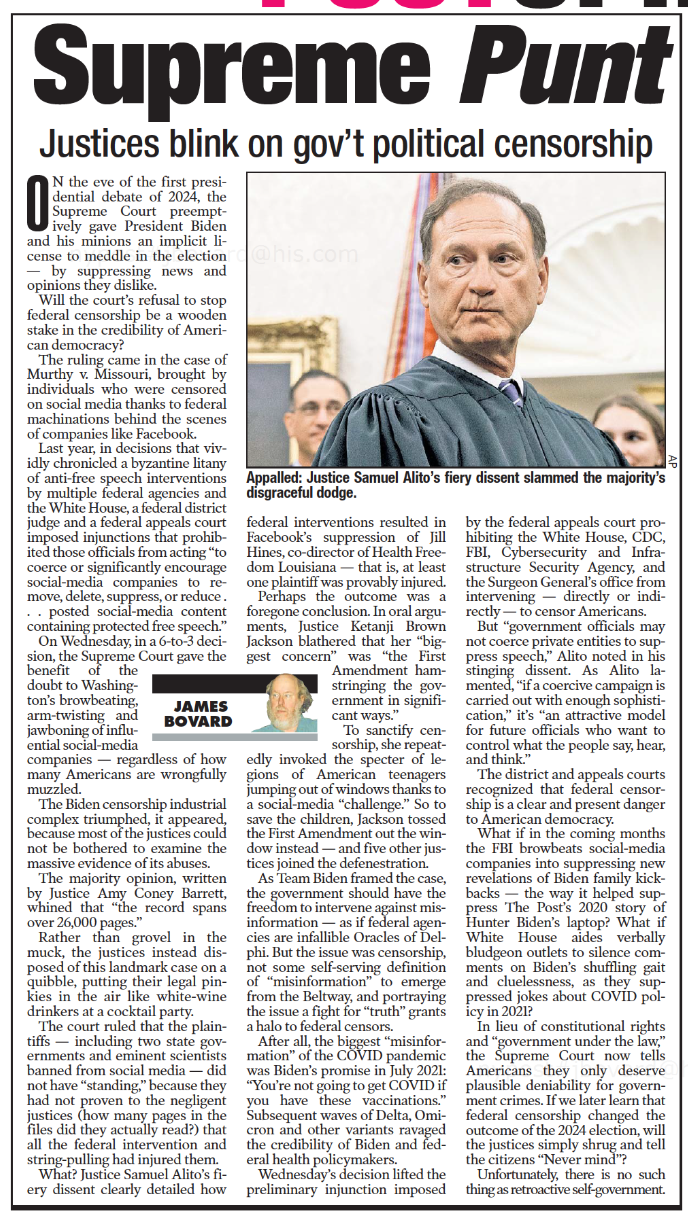Supreme Court’s censorship ruling lets Biden muzzle us online — and meddle in the election
On the eve of the first presidential debate of 2024, the Supreme Court preemptively gave President Biden and his minions an implicit license to meddle in the election — by suppressing news and opinions they dislike.
Will the court’s refusal to stop federal censorship be a wooden stake in the credibility of American democracy?
The court’s ruling came in the case of Murthy v. Missouri, brought by individuals who were censored on social media thanks to federal threats and machinations behind the scenes of companies like Facebook.
Last year, in decisions that vividly chronicled a byzantine litany of anti-free speech interventions by multiple federal agencies and the White House, a federal district judge and a federal appeals court imposed injunctions that prohibited those officials from acting “to coerce or significantly encourage social-media companies to remove, delete, suppress, or reduce . . . posted social-media content containing protected free speech.”
On Wednesday, in a 6-to-3 decision, the Supreme Court gave the benefit of the doubt to Washington’s browbeating, arm-twisting and jawboning of influential social-media companies — regardless of how many Americans are wrongfully muzzled.
The Biden censorship industrial complex triumphed, it appeared, because most of the justices could not be bothered to honestly examine the massive evidence of its abuses.
The majority opinion, written by Justice Amy Coney Barrett, whined that “the record spans over 26,000 pages.”
Quoting an earlier court decision, Barrett scoffed that “judges are not like pigs, hunting for truffles buried in the record.”
Rather than grovel in the muck, the justices instead disposed of this landmark case on a quibble, putting their legal pinkies in the air like white-wine drinkers at a cocktail party.
The court ruled that the plaintiffs — including two state governments and eminent scientists banned from social media — did not have “standing,” because they had not proven to the negligent justices (how many pages in the files did they actually read?) that all the federal intervention and string-pulling had injured them.
What? Justice Samuel Alito’s fiery dissent clearly detailed how federal interventions resulted in Facebook’s suppression of Jill Hines, co-director of Health Freedom Louisiana — that is, at least one plaintiff was provably injured.
Perhaps the outcome of this case was a foregone conclusion.
In oral arguments, Justice Ketanji Brown Jackson blathered that her “biggest concern” was “the First Amendment hamstringing the government in significant ways.” To sanctify censorship, she repeatedly invoked the specter of legions of American teenagers jumping out of windows thanks to a social-media “challenge.”
So to save the children, Jackson tossed the First Amendment out the window instead — and five other justices joined the defenestration.
Team Biden framed the case in terms of whether the government should have the freedom to intervene against misinformation — as if federal agencies are infallible Oracles of Delphi.
But the issue was censorship, not the latest self-serving definition of “misinformation” to emerge from the Beltway, and portraying the issue a fight for “truth” preemptively grants a halo to federal censors.
After all, the biggest “misinformation” of the COVID pandemic was Biden’s promise during a CNN town hall in July 2021: “You’re not going to get COVID if you have these vaccinations.”
Subsequent waves of Delta, Omicron and other variants ravaged the credibility of Biden and federal health policymakers.
Wednesday’s decision lifted the preliminary injunction imposed by the federal appeals court prohibiting the White House, CDC, FBI, Cybersecurity and Infrastructure Security Agency, and the Surgeon General’s office from intervening — directly or indirectly — to censor Americans.
But “government officials may not coerce private entities to suppress speech,” Alito noted in his stinging dissent.
As Alito lamented, the court’s ruling signals that “if a coercive campaign is carried out with enough sophistication,” it’s “an attractive model for future officials who want to control what the people say, hear, and think.”
The district and appeals courts recognized that federal censorship is a clear and present danger to American democracy.
What if in the coming months the FBI browbeats social-media companies into suppressing new revelations of Biden family kickbacks — the same way the FBI helped suppress The Post’s 2020 story of Hunter Biden’s laptop?
What if White House aides verbally bludgeon outlets to silence any comments on Biden’s shuffling gait and cluelessness, as they suppressed jokes about COVID policy in 2021?
In lieu of constitutional rights and “government under the law,” the Supreme Court now tells Americans they only deserve “plausible deniability” for government crimes. If we later learn that federal censorship changed the outcome of the 2024 election, will the justices simply shrug and tell the citizens “Never mind”? Unfortunately, there is no such thing as retroactive self-government.
James Bovard’s latest book is “Last Rights: The Death of American Liberty.”


I’m berating myself now for having gotten my hopes up following the lower court decisions; the Supremes, led by that unmatched legal scholar, Ketanji Brown Jackson, have put me back in my place. We the people are presented with an interesting challenge: how to communicate facts and ideas which are declared “disinformation” by the government?
Some Congress-humanoids are making noises about protecting free expression through new legislation, but I expect that either to fail or to be circumvented. To prevail, I expect each of us who is offended will need to be motivated enough to take part in defeating the censorship, through creative means ever-evolving as the situation changes.
It’s possible that ongoing censorship will backfire in that it will motivate more intense opposition, leading to its failure. Or, apathy and resignation may be the response. This may be America’s greatest test since its founding (though the machinations of Lincoln and Wilson and perhaps a few others are also contenders).
Yes, it is disappointing to see the top court take a dive. Not sure if enough Americans can riled up to put an end to this peril.